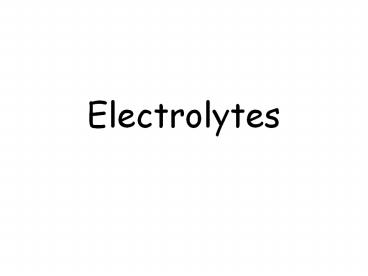Electrolytes - PowerPoint PPT Presentation
1 / 18
Title:
Electrolytes
Description:
Title: Electrolytes Subject: Chemistry 10:5/12 (22 s) Author: Jeff Christopherson Keywords: electrolytes, solution, colligative property Description – PowerPoint PPT presentation
Number of Views:687
Avg rating:3.0/5.0
Title: Electrolytes
1
Electrolytes
2
- Electricity The flow of charged particles (such
as electrons or ions) resulting in the transfer
of energy.
3
- Electrical Conductor A substance (or mixture)
that allows electric current to pass through it. - To be a conductor, a species must have charged
particles that are able to move around.
4
Pure water does not conduct an electric
currentAlthough the molecules are free to move
around, they are not charged.
5
Ionic solids do not conduct electricity.Although
they have charged particles, the particles are
not free to move around.
6
Ionic Solutions conduct a Current
7
- Electrolyte a substance that conducts
electricity when in solution due to the movement
of electrons.
8
Strong electrolyte
- A strong electrolyte is a substance that breaks
up almost completely into ions when dissolved in
water. - The resulting solution is an excellent conductor
of electricity due to the large number of charged
particles.
9
Strong electrolyte
Strong electrolytes exhibit nearly 100
dissociation.
Before dissolving 1000 0 0
In solution 0 1000
1000
10
Strong electrolyte
- Substances known to be strong electrolytes
- Soluble ionic compounds
- Strong acids
- - HClO4, HClO3, HCl, HBr, HI, HNO3, H2SO4
- Strong bases
- - LiOH, NaOH, KOH, CsOH, Ca(OH)2, Sr(OH)2,
Ba(OH)2
11
Weak electrolyte
- A weak electrolyte is a substance that has only a
few particles break up into separate ions when
dissolved in water. - The resulting solution can conduct electricity
but not very well.
12
Weak electrolyte
Weak electrolytes exhibit little dissociation.
Before dissolving 1000 0 0
In solution 980 20
20
13
Weak electrolyte
- Substances known to be weak electrolytes
- Insoluble ionic compounds
- Weak acids
- Weak bases
14
Nonelectrolyte
- A nonelectrolyte is a substance that doesnt
break up into any ions when dissolved in water. - The resulting solution is unable to conduct
electricity due to the lack of any charged
particles.
15
Nonelectrolyte
Nonelectrolytes exhibit no ionization.
C12H22O11 (s) ? C12H22O11
(aq) Before dissolving 1000 0 In
solution 0 1000
16
Nonelectrolyte
- Substances known to be nonelectrolytes
- Molecular compounds
- - The most common examples of molecular
compounds that do dissolve in water but dont
break up into ions are sugars and alcohols. - - When sugars and alcohols dissolve, the
molecules separate from each other, but they
dont break up into smaller parts. - - The particles in solution are neutral
molecules, so the solution cannot conduct
electricity.
17
Net-Ionic Equations
- The purpose of ionic equations is to show species
exactly how they truly exist. - When we write ionic equations, we need to
represent dissolved species either as ions (if
the substance gets ionized extensively) or as
molecules (if the substance only gets ionized to
a small extent, or not at all). - Strong electrolytes exist as ions in solution.
- Weak electrolytes exist primarily as molecules in
solution. - Nonelectrolytes exist completely as molecules in
solution.
18
Net-Ionic Equations
- For example, lets write CIEs and NIEs for the
following reactions. - Solutions of magnesium nitrate and sodium
carbonate are mixed. - Solutions of hydrobromic acid and calcium
hydroxide are mixed. - Solutions of phosphoric acid and potassium
hydroxide are mixed.































